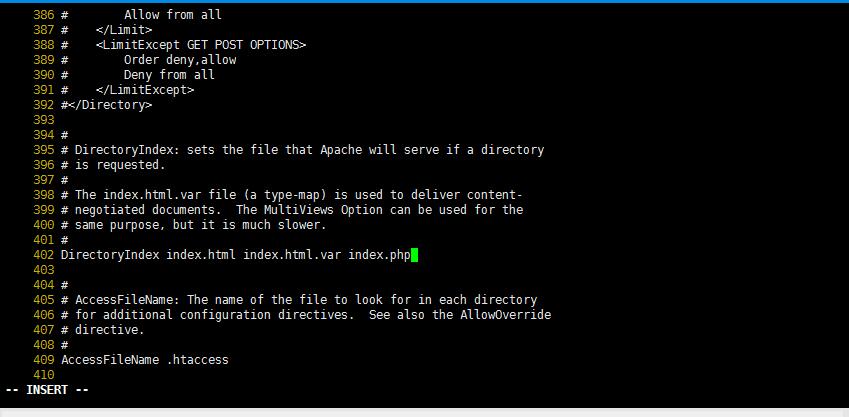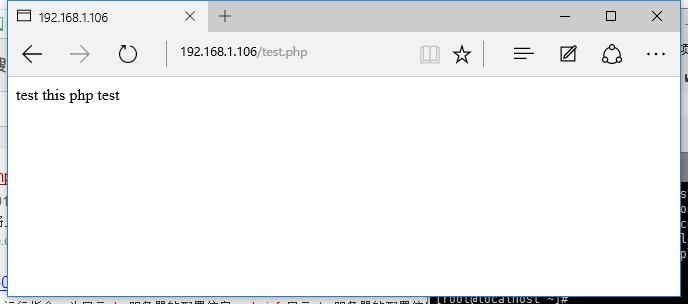LAMP是企业中最常用的服务,也是非常稳定的网站架构平台。其中L-指的是Linux,A-指的是Apache,m-指的是mysql或者marriDB,p-php。相信大家对这些都已经非常熟悉了,但是对于刚接触Linux的新手来说,可能还不是太明白,要装什么包啊,什么模块啊。其实LAMP并不难,下面用最简单的方法安装LAMP。
系统环境:centos 6.8 x86_64
[root@localhost ~]# uname -a Linux localhost.localdomain 2.6.32-642.el6.x86_64 #1 SMP Tue May 10 17:27:01 UTC 2016 x86_64 x86_64 x86_64 GNU/Linux [root@localhost ~]# cat /etc/redhat-release CentOS release 6.8 (Final) [root@localhost ~]#
LAMP相关包是否安装:
默认httpd已经安装,在这里我们说明下:本次实验我们采用的是yum的方式来进行安装,httpd就是Apache软件在RPM中的软件包名
[root@localhost ~]# rpm -qa httpd httpd-2.2.15-53.el6.centos.x86_64 [root@localhost ~]# rpm -qa mysql* [root@localhost ~]# rpm -qa php* [root@localhost ~]#
LAMP的安装其实非常简单,一条命令搞定。个人认为对于初学着没有必要搞那么多这个插件,那个插件;到了深入了解了LAMP后在根据自己实际的需求来进行模块的安装,由易道难,循序渐进的学习。
[root@localhost ~]# yum repolist \查看yum仓库的情况 Loaded plugins: fastestmirror, refresh-packagekit, security Loading mirror speeds from cached hostfile * base: mirrors.cn99.com * extras: mirrors.cn99.com * updates: mirrors.aliyun.com base | 3.7 kB 00:00 extras | 3.4 kB 00:00 updates | 3.4 kB 00:00 repo id repo name status base CentOS-6 - Base 6,696 extras CentOS-6 - Extras 62 updates CentOS-6 - Updates 482 repolist: 7,240
我们使用的是centos默认的网络yum仓库,当然如果默认yum仓库比较慢的话,可以使用epel的软件包。
[root@localhost ~]# yum -y install httpd mysql mysql-server mysql-devel php* Loaded plugins: fastestmirror, refresh-packagekit, security Setting up Install Process Loading mirror speeds from cached hostfile * base: mirrors.cn99.com * extras: mirrors.cn99.com * updates: mirrors.aliyun.com Resolving Dependencies --> Running transaction check ---> Package httpd.x86_64 0:2.2.15-53.el6.centos will be updated ---> Package httpd.x86_64 0:2.2.15-54.el6.centos will be an update --> Processing Dependency: httpd-tools = 2.2.15-54.el6.centos for package: httpd-2.2.15-54.el6.centos.x86_64 ---> Package mysql.x86_64 0:5.1.73-7.el6 will be installed .......................... Installed: mysql.x86_64 0:5.1.73-7.el6 mysql-devel.x86_64 0:5.1.73-7.el6 mysql-server.x86_64 0:5.1.73-7.el6 php.x86_64 0:5.3.3-48.el6_8 php-bcmath.x86_64 0:5.3.3-48.el6_8 php-cli.x86_64 0:5.3.3-48.el6_8 ......... Updated: httpd.x86_64 0:2.2.15-54.el6.centos Dependency Updated: httpd-tools.x86_64 0:2.2.15-54.el6.centos net-snmp-libs.x86_64 1:5.5-57.el6_8.1 openssl.x86_64 0:1.0.1e-48.el6_8.1 Complete!
我们yum命令安装httpd ,安装mysql mysql-server 和mysql-devel开发包,在php的安装包上面我们选择了php* 的命令匹配搜有php相关的包。注意,注意的操作是为了让入门童鞋们先了解LAMP的方案,在深入了解后,还是要跟进实际的情况安装搜需要的包。
安装完成LAMP后,我们需要对LAMP进行初始化,其实也就是启动服务,开机自起和必要的配置。
[root@localhost ~]# service httpd start \启动httpd服务;注意httpd和apache的关系
Starting httpd: httpd: Could not reliably determine the server's fully qualified domain name, using localhost.localdomain for ServerName
[ OK ]
[root@localhost ~]# chkconfig httpd on \设置httpd开启自器
[root@localhost ~]# service mysqld start \开启mysql服务,会提示需要初始化,很详细
Initializing MySQL database: Installing MySQL system tables...
OK
Filling help tables...
OK
To start mysqld at boot time you have to copy
support-files/mysql.server to the right place for your system
PLEASE REMEMBER TO SET A PASSWORD FOR THE MySQL root USER !
To do so, start the server, then issue the following commands:
/usr/bin/mysqladmin -u root password 'new-password'
/usr/bin/mysqladmin -u root -h localhost.localdomain password 'new-password'
Alternatively you can run:
/usr/bin/mysql_secure_installation
which will also give you the option of removing the test
databases and anonymous user created by default. This is
strongly recommended for production servers.
See the manual for more instructions.
You can start the MySQL daemon with:
cd /usr ; /usr/bin/mysqld_safe &
You can test the MySQL daemon with mysql-test-run.pl
cd /usr/mysql-test ; perl mysql-test-run.pl
Please report any problems with the /usr/bin/mysqlbug script!
[ OK ]
Starting mysqld: [ OK ]
[root@localhost ~]# chkconfig mysqld on \设置mysql开机自启动
[root@localhost ~]# mysqladmin -u root password linuxprobe.com
\初始化mysql,在这里需要设置mysql的root的密码;命令:mysqladmin -u 用户 password 密码
[root@localhost ~]# mysql -u root -p \登录mysql查看是否能够登录
Enter password:
Welcome to the MySQL monitor. Commands end with ; or g.
Your MySQL connection id is 3
Server version: 5.1.73 Source distribution
Copyright (c) 2000, 2013, Oracle and/or its affiliates. All rights reserved.
Oracle is a registered trademark of Oracle Corporation and/or its
affiliates. Other names may be trademarks of their respective
owners.
Type 'help;' or 'h' for help. Type 'c' to clear the current input statement.
mysql> \ok登录成功
注意:在yum安装lamp的时候,其实php只是apache的一个集成的组件,不需要添加模块的应用,只要在配置文件中启用就可以了。
[root@localhost ~]# ps -aux |grep httpd \查看httpd的进程 Warning: bad syntax, perhaps a bogus '-'? See /usr/share/doc/procps-3.2.8/FAQ root 2930 0.0 2.9 487660 14664 ? Ss 10:46 0:00 /usr/sbin/httpd apache 2933 0.0 1.9 487660 9400 ? S 10:46 0:00 /usr/sbin/httpd apache 2934 0.0 1.8 487660 9112 ? S 10:46 0:00 /usr/sbin/httpd apache 2935 0.0 1.9 487660 9400 ? S 10:46 0:00 /usr/sbin/httpd apache 2936 0.0 1.9 487660 9392 ? S 10:46 0:00 /usr/sbin/httpd apache 2937 0.0 1.8 487660 9116 ? S 10:46 0:00 /usr/sbin/httpd apache 2938 0.0 1.8 487660 9136 ? S 10:46 0:00 /usr/sbin/httpd apache 2939 0.0 1.8 487660 9112 ? S 10:46 0:00 /usr/sbin/httpd apache 2940 0.0 2.3 487844 11840 ? S 10:46 0:00 /usr/sbin/httpd root 10163 0.0 0.1 103316 868 pts/3 S+ 12:23 0:00 grep httpd [root@localhost ~]# ps -aux |grep mysql \查看mysql的相关进程 Warning: bad syntax, perhaps a bogus '-'? See /usr/share/doc/procps-3.2.8/FAQ root 3035 0.0 0.2 108216 1452 pts/1 S 10:47 0:00 /bin/sh /usr/bin/mysqld_safe --datadir=/var/lib/mysql --socket=/var/lib/mysql/mysql.sock --pid-file=/var/run/mysqld/mysqld.pid --basedir=/usr --user=mysql mysql 3137 0.0 4.3 367512 21444 pts/1 Sl 10:47 0:02 /usr/libexec/mysqld --basedir=/usr --datadir=/var/lib/mysql --user=mysql --log-error=/var/log/mysqld.log --pid-file=/var/run/mysqld/mysqld.pid --socket=/var/lib/mysql/mysql.sock root 10165 0.0 0.1 103316 868 pts/3 S+ 12:23 0:00 grep mysql [root@localhost ~]# netstat -tanulp |grep 80 \查看httpd 的端口对外监听 tcp 0 0 192.168.1.108:50878 63.80.4.177:80 ESTABLISHED 2629/clock-applet tcp 0 0 :::80 :::* LISTEN 2930/httpd [root@localhost ~]# netstat -tanulp |grep 3306 \查看mysql的端口对外监听 tcp 0 0 0.0.0.0:3306 0.0.0.0:* LISTEN 3137/mysqld
[root@localhost ~]# iptables -L \查看iptables的规则
Chain INPUT (policy ACCEPT)
target prot opt source destination
ACCEPT all -- anywhere anywhere state RELATED,ESTABLISHED
ACCEPT icmp -- anywhere anywhere
ACCEPT all -- anywhere anywhere
ACCEPT tcp -- anywhere anywhere state NEW tcp dpt:ssh
REJECT all -- anywhere anywhere reject-with icmp-host-prohibited
Chain FORWARD (policy ACCEPT)
target prot opt source destination
REJECT all -- anywhere anywhere reject-with icmp-host-prohibited
Chain OUTPUT (policy ACCEPT)
target prot opt source destination
[root@localhost ~]# iptables -I INPUT 1 -p tcp --dport 80 -j ACCEPT
\添加iptables INPUT的链的第一条规则允许tcp协议的80端口
\关于iptables 的更多设置,请参考《linux就该这样学》相关内容
[root@localhost ~]# service iptables save \将我们的添加的规则保存在配置文件
iptables: Saving firewall rules to /etc/sysconfig/iptables:[ OK ]
[root@localhost ~]# iptables -L \查看保存情况
Chain INPUT (policy ACCEPT)
target prot opt source destination
ACCEPT tcp -- anywhere anywhere tcp dpt:http
ACCEPT all -- anywhere anywhere state RELATED,ESTABLISHED
ACCEPT icmp -- anywhere anywhere
ACCEPT all -- anywhere anywhere
ACCEPT tcp -- anywhere anywhere state NEW tcp dpt:ssh
REJECT all -- anywhere anywhere reject-with icmp-host-prohibited
Chain FORWARD (policy ACCEPT)
target prot opt source destination
REJECT all -- anywhere anywhere reject-with icmp-host-prohibited
Chain OUTPUT (policy ACCEPT)
target prot opt source destination
添加一个测试的静态index.html页面,或者使用默认的页面进行测试。关于添加网站页面的更多问题,请参考《linux就该这样学》的相关内容
[root@localhost ~]# echo "hello word" > /var/www/html/index.html
测试用ie浏览器测试静态页面:

ok,测试成功。
[root@localhost ~]# ls /etc/httpd/ \配置文件目录,相关配置模块
conf/ conf.d/ logs/ modules/ run/
[root@localhost ~]# vi /etc/httpd/conf/
httpd.conf magic
[root@localhost ~]# vi /etc/httpd/conf/httpd.conf \主配文件
[root@localhost ~]# wc -l /etc/httpd/conf/httpd.conf
1009 /etc/httpd/conf/httpd.conf
\ 主配文件共有1009行,其中有好多都是注释的.养成好习惯,备份默认配置文件
[root@localhost ~]# tail /etc/httpd/conf/httpd.conf \更多配置建议参考《linux就该这样学》相关内容
# The first VirtualHost section is used for requests without a known
# server name.
#
# \配置文件中添加虚拟主机的语句
# ServerAdmin webmaster@dummy-host.example.com
# DocumentRoot /www/docs/dummy-host.example.com
# ServerName dummy-host.example.com
# ErrorLog logs/dummy-host.example.com-error_log
# CustomLog logs/dummy-host.example.com-access_log common
#
LAMP是一个稳定的动态的网站架构方案,在这里我们需要添加php的支持,测试动态网站。
[root@localhost ~]# vi /etc/httpd/conf/httpd.conf

[root@localhost ~]# cat /etc/httpd/conf/httpd.conf |grep DirectoryIndex
\在配置文件402行添加对php页面的支持
# DirectoryIndex: sets the file that Apache will serve if a directory
[root@localhost ~]# vi /var/www/html/index.php [root@localhost ~]# cat /var/www/html/index.php \添加php信息的测试页面 [root@localhost ~]# vi /var/www/html/test.php [root@localhost ~]# cat /var/www/html/test.php \添加php页面测试 test this php test
测试:


注意:
动态网页搭建动族论坛 过程略,大家自己测试
Apache:httpd(服务名) 80 (端口)
Mysql: mysqld(服务名) 3306(端口,默认只对本地监听)
php:在apache 中集成,只需添加启用php默认文档即可
lamp的日志等功能,建议查看相关文档
建议安装lamp为了让入门童鞋更加容易了解lamp,生产环境要根据实际情况安装不通的组件。LAMP,so easy!!!
本文转载地址:https://www.linuxprobe.com/yum-lamp-easy.html